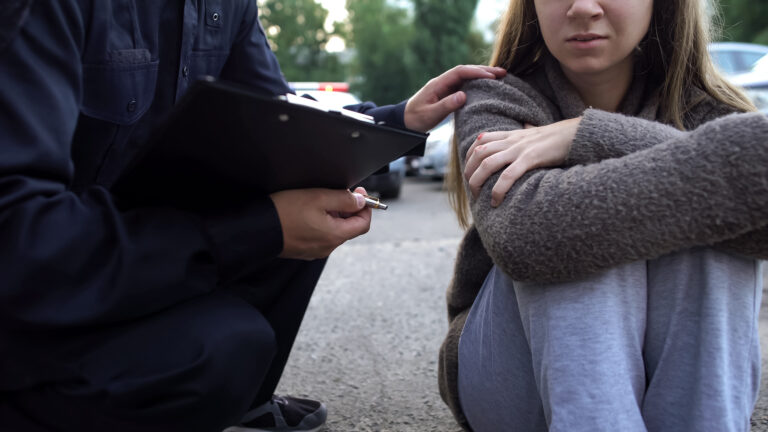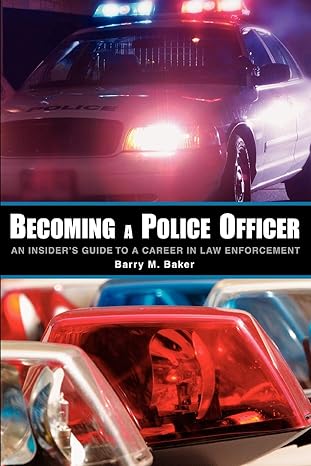
The most important thing for you to remember is to never do anyone harm through insensitivity.
~ Barry M. Baker Tweet

Detective Lieutenant Barry M. Baker (ret.) is a 32 year veteran of the Baltimore Police Department.
Police and compassion is not mutually exclusive, and you’ll witness many acts of compassion by police toward victims and suspects alike. Whatever expectations you have for a police career, you will frequently become involved in real human tragedies. You need to possess some capacity for compassion, and you’ll need an ability to display sensitivity toward others experiencing tragedy.
Consider the human capacity for inflicting harm, and the unbelievable number of ways that harm can be inflicted. You could find yourself working in an environment where crimes of violence of every conceivable nature are commonplace. You’ll have the ability to prevent or mitigate tragedy in some instances, but most will be beyond your control. Police and compassion can be relevant to some in the “beyond your control” group.
Three Fingers and a Sawed-Off Shotgun
The reattachment of severed limbs such as fingers is now a fairly common medical procedure. When some hospitals first began attempting those procedures with some success, I was a patrol officer. I responded as a back-up officer to a report of gunfire. We found a young man rolling around on the sidewalk grasping his left hand. He was screaming and bleeding, and a sawed-off shotgun was lying on the sidewalk nearby.
Normally, witnesses were not that forthcoming, but three teenage girls quickly filled me in on the details. The victim was an area drug dealer, and he was involved in an argument with a rival drug dealer. The argument escalated, and the victim had difficulty removing his shotgun that he had concealed inside his pants. At some point he placed his left hand over the end of the barrel, and the gun discharged.
The blast amputated the victim’s index, middle, and ring fingers of his left hand. The fingers were of no evidentiary value, and no departmental directive yet existed for such circumstances. However, I had read about the possibility of reattachment, and I had followed a lot of victims to Johns Hopkins Hospital. I witnessed those doctors do some pretty remarkable things.
A Paper Cup and Ice
I began searching for the fingers with the assistance of the three girls. It took us a little time, because the blast had hurled the fingers far and wide. One of the girls was drinking a soda from a large paper cup. She dumped her drink, and she offered the cup to carry the fingers. I then walked to a liquor store nearby where the store owner helped me pack the fingers with ice.
To say that I showed compassion for this victim wouldn’t be entirely accurate, because I felt no compassion for him. Had he not shot himself, he may have murdered the other drug dealer. Even worse, he could have killed or wounded an innocent bystander. I only did what I thought to be the right thing to do, and that’s where it ended. I never made any attempt to learn if the doctors had any success in reattaching his fingers. Still, my actions fit the police and compassion paradigm.
She Committed Murder – Police and Compassion
There are many people who are not, and never will be, deserving of much compassion. Of course, you will meet those who are deserving of your compassion.
It was just after 8am on a Sunday morning. I began my foot patrol assignment in a residential neighborhood experiencing a rash of daytime street robberies. I stood at the corner of a very empty intersection. As I looked around, I saw an elderly woman walking toward me. The woman, who I would later learn was 78 years old, was all dressed up and heading for church which I would soon learn.
She was a small woman and frail as you might expect a woman of her age to be. As she walked directly toward me, she made eye contact with me, and I smiled and said, “Good morning.” I received no smile or similar greeting in return. The woman stopped and looked up at me as she spoke, “Officer, I need you to come to my house. I just killed my husband.”
A Large Hole in his Head
We walked in silence to her home which was in the same block. We walked through the front door, and I asked, “Where is he?” The woman pointed to the stairway leading to the second floor. I quickly located her husband on the stairway landing between the first and second floor. The 80 year old was a big man, and he looked to have been fit for his age. He was in an awkward sitting position with his back against the wall, and his head was slumped forward.
The large hole in his left eye socket was obvious, and it was also obvious that he was dead. There was very little blood, and it was not immediately evident that the hole was the result of a gunshot wound since I observed no exit wound. That question was soon resolved when I moved his head back to get a closer look at the wound. His skull was shattered, and it felt like I was holding a bean bag.
I turned toward the woman and asked, “Where’s the gun?” She led me to the kitchen where she pointed to a 4-10 gauge shotgun leaning against the wall. The small gauge of the shotgun accounted for the lack of an exit wound as well as the frail woman’s ability to use the weapon. I then simply asked, “What happened?”
Denied Her Permission to Attend Church
She explained that she had gotten ready for church, but her husband denied her permission to attend church. He was standing on the top landing blocking the stairway when she retrieved the shotgun from the upstairs bedroom. She explained that she simply pointed the gun and pulled the trigger. Her husband tumbled down the stairway and came to rest where I’d observed him.
She told me that after nearly sixty years of marriage, she “just couldn’t take it anymore.” She went on to say that she’d intended to go to church and tell her pastor what had happened. On her way to church she saw me, and she realized she should tell me what had happened.
The woman had initially admitted her guilt to me with the unsolicited statement that she’d killed her husband. Feeling a sense of compassion toward the woman, I purposely did not give her Miranda warnings at that time. I wanted to know more, but I didn’t want further statements to put her in more jeopardy. Eventually, I gave her Miranda warnings, and I emphasized her right to say nothing to police officers.
I then ask the woman if she had any family members or others she’d like to have contacted. Following her wishes, I telephoned her granddaughter and explained the circumstances. I also promised to stop by her church and explain to her pastor why she was absent.
I fulfilled My Promise – Police and Compassion
As we waited for arrival of the Homicide detectives, I explained that the detectives would be very nice to her, but she didn’t have to talk about the incident; until, her granddaughter could arrange for an attorney. She indicated her understanding of my directions, but I knew the detectives would have her talking in no time. She had the innocence of a child.
After I cleared the crime scene, I kept my promise. I located the woman’s pastor, and I filled him in on the events of that morning. My conversation with the pastor revealed that the woman was well positioned with support from her family and the community. I never learned my suspect’s fate. I was never contacted by a prosecutor, and I never received a court summons. It was evident that my police and compassion extended through to her final adjudication.
You never want to lose your capacity to show compassion; however, you don’t want to go the other way either. Television police dramas often depict police and compassion with scenes of officers agonizing over the tragedies of others. You’ll see documentaries and breaking news stories where real cops are gushing with hand wringing emotional displays of compassion. One could begin to wonder which is imitating the other.
Don’t get too involved – Police and Compassion
As a police officer, you’re the person who’s supposed to keep your head when those around you are losing theirs. When you allow your compassion to go too far, you’ll quickly run out of energy and time to fulfill unrealistic commitments. You’ll have many ways to aid others in time of tragedy that are completely within your powers as a police officer without personalizing that aid.
Why do you think psychiatrists and psychologists treat each other? It’s because, unlike you, they have fewer meaningful ways of influencing or controlling the behavior of others. When you let your compassion take you beyond what you can realistically do, and into that murky world of psychology, you’re going to suffer the same stress of frustration from over commitment and failure.
An Unexpected Response
A friend of mine was barely past brand new when he got his first assignment to make a death notification. He had to notify a mother that her son had been murdered in another state. He got all the information, and he rehearsed what he might say as he drove to the woman’s residence.
The officer knocked on the door, and a woman answered. He verified the woman’s identity. Forgetting most of what he’d rehearsed, he simply came to the point as best as he could, “I’m sorry to have to tell you that your son, Marcus, died this morning in South Carolina.” Actually, he did quite well. He didn’t use words like murdered, shot to death, killed, etc. He braced himself for an emotional response from the woman.
The woman paused for a few seconds with a puzzled expression on her face. “Which one is that,” she asked? The officer got his response, but one for which he was totally unprepared. As it turned out, the woman had ten children. Most had left her care at young ages for various reasons, and she was simply having a problem putting the name with the face. She displayed no emotion as the officer ended his non-event by giving her all the information he had regarding the death of her son.
Never do harm – Police and Compassion
The most important thing for you to remember is to never do anyone harm through insensitivity. Even when people are undeserving of any display of compassion from you, it won’t kill you to show a little anyway. When you encounter those who are truly deserving of your compassion, just don’t let yourself get carried away. This is the true definition of police and compassion.
Related Content for Police and Compassion
Advertisements


